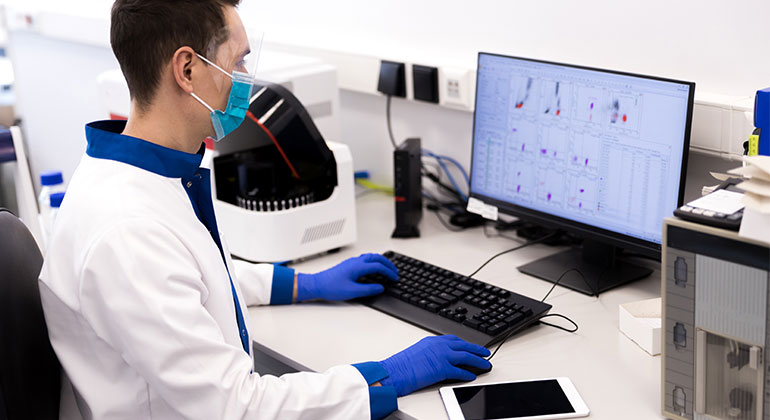Growth Hormone Treatment Improves Social Impairments in Patients with Genetic Disorder Known to Cause Autism
A growth hormone can significantly improve the social impairment associated with autism spectrum disorder (ASD) in patients with a related genetic syndrome.
A growth hormone can significantly improve the social impairment associated with autism spectrum disorder (ASD) in patients with a related genetic syndrome, according to a pilot study conducted at the Icahn School of Medicine at Mount Sinai and published today on Pub Med, a public database of biomedical topics maintained by the National Institutes of Health (study originally published in the December 12 issue of the journal Molecular Autism).
The study results focus specifically on the use of insulin-like growth factor-1 (IGF-1) to treat Phelan-McDermid syndrome (PMS), a disorder caused by a deletion or mutation of the SHANK3 gene on chromosome 22. Along with facing developmental and language delays and motor skill deficits, most people with PMS also have autism spectrum disorder.
SHANK3 is a focus of research in the field because of its essential role in the function of synapses, the gaps between nerve cells that “decide” whether messages continue along nerve pathways as they regulate bodily processes. While Phelan-McDermid syndrome is a rare disorder, advanced genetic technology has revealed it to be a relatively common cause of ASD.
“Ours is the first controlled trial of any treatment for Phelan-McDermid syndrome,” says Alexander Kolevzon, MD, Clinical Director of the Seaver Autism Center at the Icahn School of Medicine at Mount Sinai. “Because different genetic causes of ASD converge on common underlying chemical signaling pathways, the findings of this study may have implications for many forms of ASD.”
IGF-1 is a commercially available compound that promotes nerve cell survival, synaptic maturation and synaptic plasticity, the ability of synapses to strengthen or weaken over time, in response to increases or decreases in their activity. It is currently approved by the Food and Drug Administration for the treatment of short stature.
The Mount Sinai study is the first to suggest that IGF-1 is safe, tolerable and associated with significant improvement in both social impairment and restrictive behaviors (fascination with one subject or activity; strong attachment to one specific object; preoccupation with part[s] of an object rather than the whole object; preoccupation with movement or things that move) in people with Phelan-McDermid syndrome, said the study authors.
Researchers enrolled nine children aged 5-15 years who were diagnosed with Phelan-McDermid syndrome in a placebo-controlled, double-blind, cross-over design study. All participants were exposed to three months of treatment with IGF-1 and three months of placebo, in random order. Compared to placebo, the IGF-1 phase was associated with significant improvement in social withdrawal and restrictive behaviors as measured by the Aberrant Behavior Checklist and the Repetitive Behavior Scale respectively, both standard behavior scales used to assess treatment effects in ASD.
Preclinical studies of SHANK3 deficient mouse models developed at Mount Sinai and human neuronal models derived from pluripotent stem cells (stem cells that have the capacity to produce several distinct biological responses) of humans with SHANK3 deficiency previously suggested that IGF-1 can reverse synaptic plasticity and motor learning deficits. These studies formed the basis of this clinical trial and the results provide support for the ongoing effort to develop related drug treatments.
“This clinical trial is part of a paradigm shift to develop targeted, disease modifying medicines specifically to treat the core symptoms of ASD,” says Joseph Buxbaum, PhD, Director of the Seaver Autism Center and Professor of Psychiatry, Genetics and Genomic Sciences and Neuroscience at Mount Sinai. “Results from this pilot trial will facilitate larger studies that more definitively inform efficacy and better targeted therapeutic treatments.”
This study was funded by that Beatrice and Samuel A. Seaver Foundation and by the National Institute of Mental Health, part of the National Institutes of Health.
About the Seaver Autism Center for Research and Treatment at Mount Sinai
The Seaver Autism Center for Research and Treatment at Mount Sinai conducts progressive research studies aimed at understanding the multiple causes of autism spectrum disorders (ASD). The multidisciplinary team is comprised of experts in the fields of genetics, molecular biology, model systems, neuroimaging, and experimental therapeutics who are dedicated to discovering the biological causes of ASD. The Center strives to develop innovative diagnostics and treatments for integration into the provision of personalized, comprehensive assessment and care for people with ASD. The Seaver Autism Center was founded through the generous support of the Beatrice and Samuel A. Seaver Foundation. For more information, visit www.seaverautismcenter.org.
About the Mount Sinai Health System
Mount Sinai Health System is one of the largest academic medical systems in the New York metro area, with 48,000 employees working across eight hospitals, more than 400 outpatient practices, more than 600 research and clinical labs, a school of nursing, and a leading school of medicine and graduate education. Mount Sinai advances health for all people, everywhere, by taking on the most complex health care challenges of our time—discovering and applying new scientific learning and knowledge; developing safer, more effective treatments; educating the next generation of medical leaders and innovators; and supporting local communities by delivering high-quality care to all who need it.
Through the integration of its hospitals, labs, and schools, Mount Sinai offers comprehensive health care solutions from birth through geriatrics, leveraging innovative approaches such as artificial intelligence and informatics while keeping patients’ medical and emotional needs at the center of all treatment. The Health System includes approximately 9,000 primary and specialty care physicians and 11 free-standing joint-venture centers throughout the five boroughs of New York City, Westchester, Long Island, and Florida. Hospitals within the System are consistently ranked by Newsweek’s® “The World’s Best Smart Hospitals, Best in State Hospitals, World Best Hospitals and Best Specialty Hospitals” and by U.S. News & World Report's® “Best Hospitals” and “Best Children’s Hospitals.” The Mount Sinai Hospital is on the U.S. News & World Report® “Best Hospitals” Honor Roll for 2024-2025.
For more information, visit https://www.mountsinai.org or find Mount Sinai on Facebook, Twitter and YouTube.

The Mount Sinai Hospital Ranked Among World’s Best in Newsweek/Statista Rankings
Mar 10, 2025 View All Press Releases






